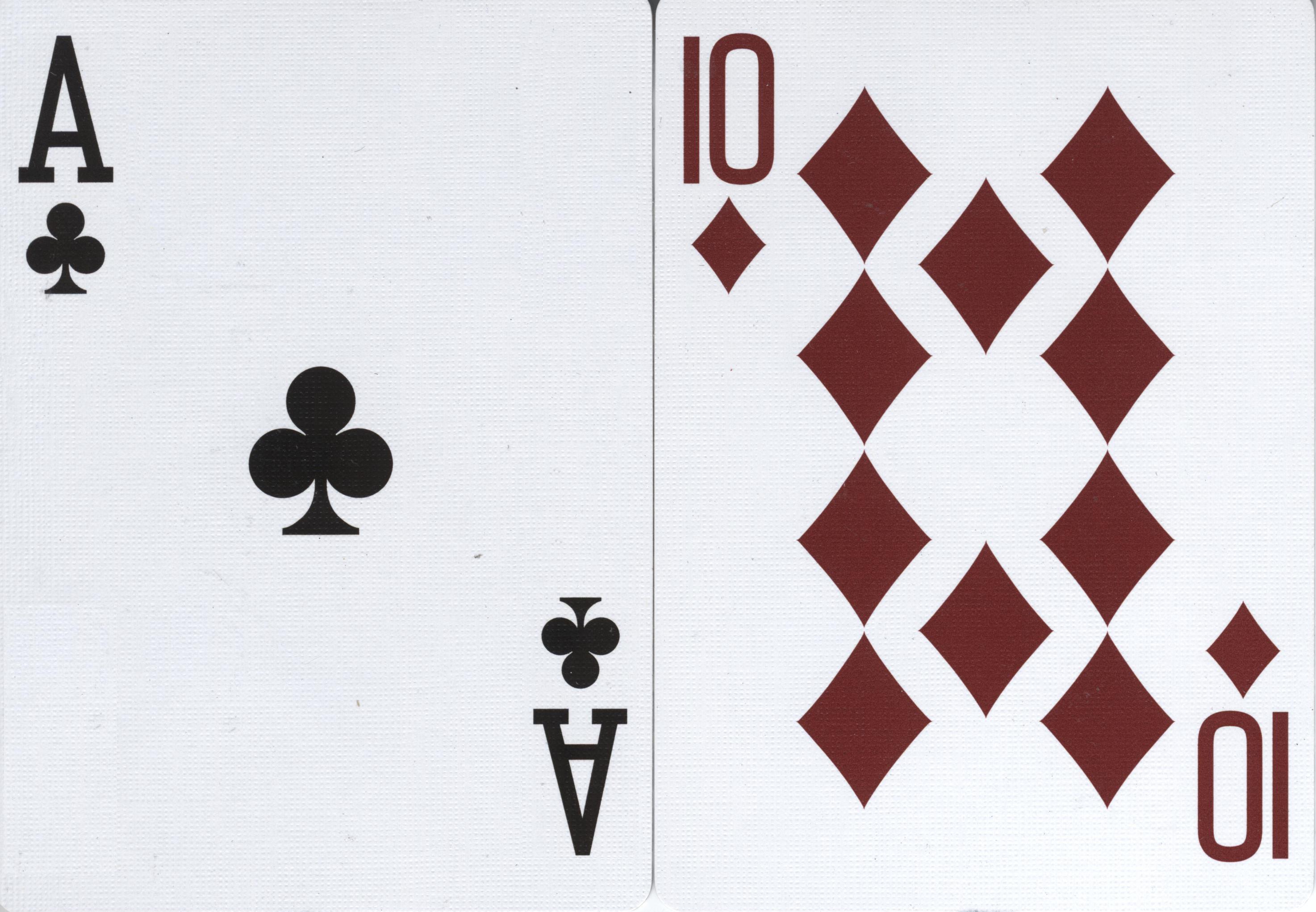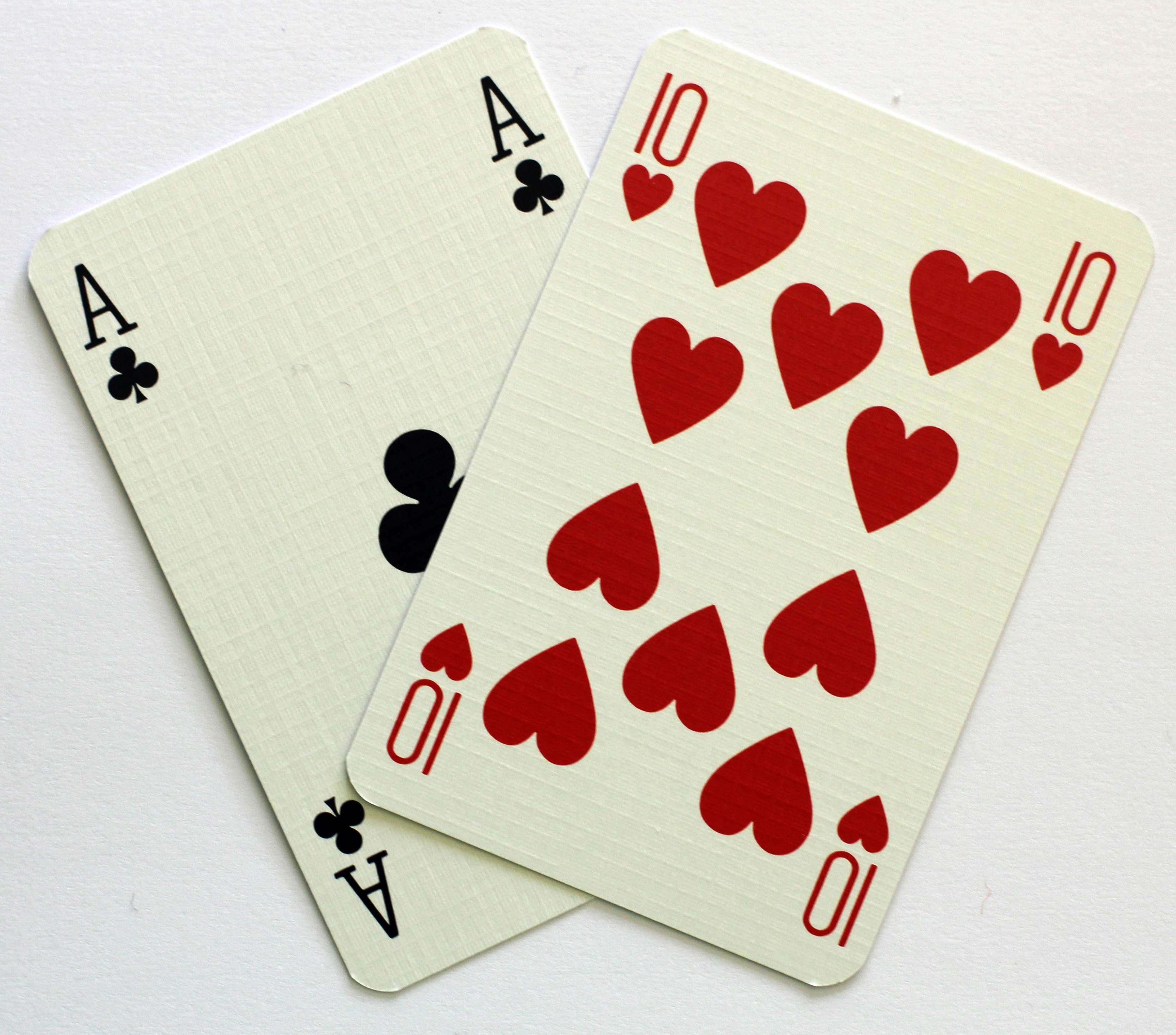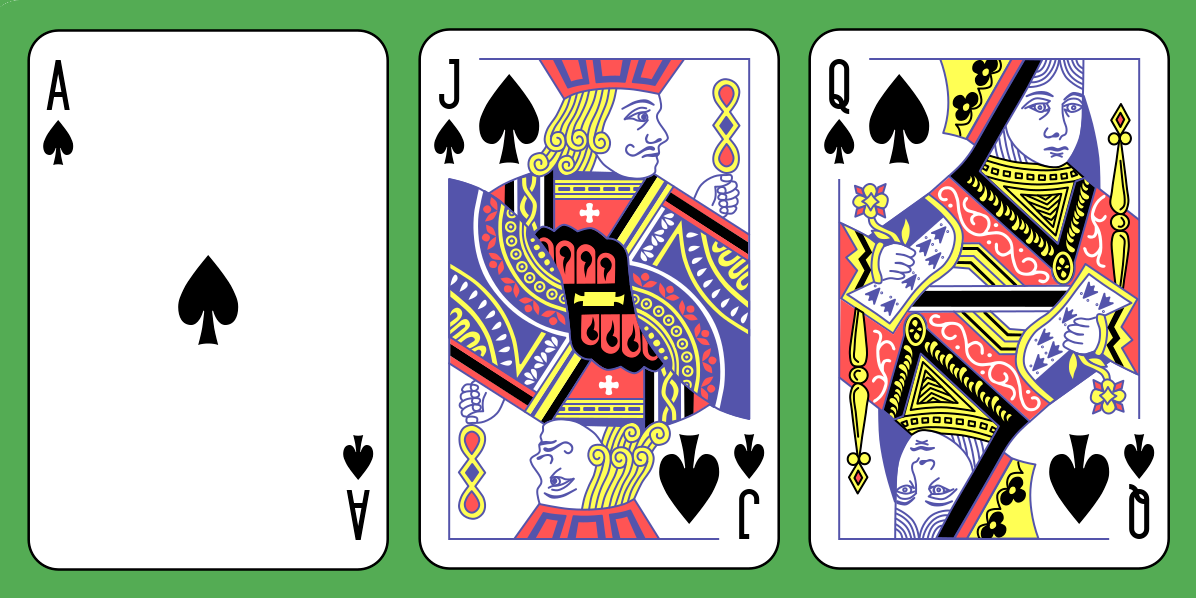|
Vingt-Un
Twenty-one, formerly known as vingt-un in Britain, France and America, is the name given to a family of popular card games of the gambling family, the progenitor of which is recorded in Spain in the early 17th century. The family includes the casino games of blackjack and pontoon as well as their domestic equivalents. Twenty-one rose to prominence in France in the 18th century and spread from there to Germany and Britain from whence it crossed to America. Known initially as ''vingt-un'' in all those countries, it developed into pontoon in Britain after the First World War and blackjack in Canada and the United States in the late 19th century, where the legalisation of gambling increased its popularity. History Spanish origins The game is first mentioned by name in a 1611 Spanish dictionary where, under the entry for "card" (''carta''), it mentions the game of ''ventiuno'' ("twenty-one"). Just two years later, the first brief description of the game is given in a novella by Spa ... [...More Info...] [...Related Items...] OR: [Wikipedia] [Google] [Baidu] |
Pontoon (card Game)
Pontoon, formerly called Vingt-Un, is a card game of the banking family for three to ten players and the "British domestic version of Twenty-One," a game first recorded in 17th-century Spain, but which spread to France, Germany and Britain in the late 18th century, and America during the early 19th century. It is neither a variant of nor derived from Blackjack. Both are descended from the early British version of ''Vingt-Un''. In Britain, it first became known as Pontoon during the First World War, the name apparently being a soldier's corruption of its former French name. The game has no official rules and varies widely from place to place. It is a popular family game, but also widely played by children, students, and members of the armed forces. In 1981, Pontoon was the third most popular card game in Britain after Rummy and Whist. It has been described as "an amusing round game and one which anyone can learn in a few minutes." History Vingt-Un is first recorded in the secon ... [...More Info...] [...Related Items...] OR: [Wikipedia] [Google] [Baidu] |
Blackjack
Blackjack (formerly Black Jack and Vingt-Un) is a casino banking game. The most widely played casino banking game in the world, it uses decks of 52 cards and descends from a global family of casino banking games known as Twenty-One. This family of card games also includes the British game of Pontoon, the European game, Vingt-et-Un and the Russian game Ochko. Blackjack players do not compete against each other. The game is a comparing card game where each player competes against the dealer. History Blackjack's immediate precursor was the English version of '' twenty-one'' called ''Vingt-Un'', a game of unknown (but likely Spanish) provenance. The first written reference is found in a book by the Spanish author Miguel de Cervantes. Cervantes was a gambler, and the protagonists of his " Rinconete y Cortadillo", from ''Novelas Ejemplares'', are card cheats in Seville. They are proficient at cheating at ''veintiuna'' (Spanish for "twenty-one") and state that the object of the gam ... [...More Info...] [...Related Items...] OR: [Wikipedia] [Google] [Baidu] |
Blackjack
Blackjack (formerly Black Jack and Vingt-Un) is a casino banking game. The most widely played casino banking game in the world, it uses decks of 52 cards and descends from a global family of casino banking games known as Twenty-One. This family of card games also includes the British game of Pontoon, the European game, Vingt-et-Un and the Russian game Ochko. Blackjack players do not compete against each other. The game is a comparing card game where each player competes against the dealer. History Blackjack's immediate precursor was the English version of '' twenty-one'' called ''Vingt-Un'', a game of unknown (but likely Spanish) provenance. The first written reference is found in a book by the Spanish author Miguel de Cervantes. Cervantes was a gambler, and the protagonists of his " Rinconete y Cortadillo", from ''Novelas Ejemplares'', are card cheats in Seville. They are proficient at cheating at ''veintiuna'' (Spanish for "twenty-one") and state that the object of the gam ... [...More Info...] [...Related Items...] OR: [Wikipedia] [Google] [Baidu] |
Trente-un
Thirty-one or Trente et un is a gambling card game played by two to seven people, where players attempt to assemble a hand which totals 31. Such a goal has formed the whole or part of various games like Commerce, Cribbage, Trentuno, and Wit and Reason since the 15th century. 31 is popular in America and Britain. Although the game is also known as Scat it has no connexion whatsoever with Germany's national card game of Skat. It should also not be confused with other games called 31 including Schwimmen (also known as Schnauz or Hosen 'runter) and the Greek banking game of 31. Names The game is also known as Blitz, Scat, Cadillac in south Louisiana and Mississippi, Cad in Pennsylvania, Whammy! in central Indiana, Juble in Oklahoma and Kansas, as also as Kitty, High Hat, Ride the Bus and Geronimo.''31 / Scat / Ride the Bus / Cadillac ... [...More Info...] [...Related Items...] OR: [Wikipedia] [Google] [Baidu] |
Novelas Ejemplares
''Novelas ejemplares'' ("Exemplary Novels") is a series of twelve novellas that follow the model established in Italy. The series was written by Miguel de Cervantes between 1590 and 1612 and printed in Madrid in 1613 by Juan de la Cuesta. ''Novelas ejemplares'' followed the publication of the first part of ''Don Quixote''. The novelas were well received. Cervantes boasted in his foreword to have been the first to write ''novelas'' in the Spanish language: My genius and my inclination prompt me to this kind of writing; the more so as I consider (and with truth) that I am the first who has written novels in the Spanish language, though many have hitherto appeared among us, all of them translated from foreign authors. But these are my own, neither imitated nor stolen from anyone; my genius has engendered them, my pen has brought them forth, and they are growing up in the arms of the press. The novellas are usually grouped into two series: those characterized by an idealized natu ... [...More Info...] [...Related Items...] OR: [Wikipedia] [Google] [Baidu] |
Seville
Seville (; es, Sevilla, ) is the capital and largest city of the Spanish autonomous community of Andalusia and the province of Seville. It is situated on the lower reaches of the River Guadalquivir, in the southwest of the Iberian Peninsula. Seville has a municipal population of about 685,000 , and a metropolitan population of about 1.5 million, making it the largest city in Andalusia, the fourth-largest city in Spain and the 26th most populous municipality in the European Union. Its old town, with an area of , contains three UNESCO World Heritage Sites: the Alcázar palace complex, the Cathedral and the General Archive of the Indies. The Seville harbour, located about from the Atlantic Ocean, is the only river port in Spain. The capital of Andalusia features hot temperatures in the summer, with daily maximums routinely above in July and August. Seville was founded as the Roman city of . Known as ''Ishbiliyah'' after the Islamic conquest in 711, Seville became ... [...More Info...] [...Related Items...] OR: [Wikipedia] [Google] [Baidu] |
Spanish Playing Cards
Spanish-suited playing cards or Spanish-suited cards have four suits, and a deck is usually made up of 40 or 48 cards (or even 50 by including two jokers). It is categorized as a Latin-suited deck and has strong similarities with the Italian-suited deck and some to the French deck. Spanish-suited cards are used in Spain, southern Italy, parts of France, Hispanic America, North Africa, and the Philippines. Description Playing cards, originally of Chinese origin, were adopted Mamluk Egypt by the 14th century if not earlier, and from there spread to the Iberian peninsula. The Spanish word ''naipes'' is loaned from ''nā'ib'', ranks of face cards found in the Mamluk deck. The earliest record of ''naip'' comes from a Valencian rhyming dictionary by Jaume March II in 1371, but without any context or definition. By 1380, ''naipero'' (card-maker) was a recognized profession. Valencia's town council issued a blanket ban on ''un novell joch apellat dels naips'' (a new game called c ... [...More Info...] [...Related Items...] OR: [Wikipedia] [Google] [Baidu] |
Kingdom Of Castile
The Kingdom of Castile (; es, Reino de Castilla, la, Regnum Castellae) was a large and powerful state on the Iberian Peninsula during the Middle Ages. Its name comes from the host of castles constructed in the region. It began in the 9th century as the County of Castile (''Condado de Castilla''), an eastern frontier lordship of the Kingdom of León. During the 10th century, its counts increased their autonomy, but it was not until 1065 that it was separated from León and became a kingdom in its own right. Between 1072 and 1157, it was again united with León, and after 1230, this union became permanent. Throughout this period, the Castilian kings made extensive conquests in southern Iberia at the expense of the Al-Andalus, Islamic principalities. The Kingdoms of Castile and of León, with their southern acquisitions, came to be known collectively as the Crown of Castile, a term that also came to encompass overseas expansion. History 9th to 11th centuries: the beginnings Accor ... [...More Info...] [...Related Items...] OR: [Wikipedia] [Google] [Baidu] |
Napoleon
Napoleon Bonaparte ; it, Napoleone Bonaparte, ; co, Napulione Buonaparte. (born Napoleone Buonaparte; 15 August 1769 – 5 May 1821), later known by his regnal name Napoleon I, was a French military commander and political leader who rose to prominence during the French Revolution and led successful campaigns during the Revolutionary Wars. He was the ''de facto'' leader of the French Republic as First Consul from 1799 to 1804, then Emperor of the French from 1804 until 1814 and again in 1815. Napoleon's political and cultural legacy endures to this day, as a highly celebrated and controversial leader. He initiated many liberal reforms that have persisted in society, and is considered one of the greatest military commanders in history. His wars and campaigns are studied by militaries all over the world. Between three and six million civilians and soldiers perished in what became known as the Napoleonic Wars. Napoleon was born on the island of Corsica, not long af ... [...More Info...] [...Related Items...] OR: [Wikipedia] [Google] [Baidu] |
Louis XV
Louis XV (15 February 1710 – 10 May 1774), known as Louis the Beloved (french: le Bien-Aimé), was King of France from 1 September 1715 until his death in 1774. He succeeded his great-grandfather Louis XIV at the age of five. Until he reached maturity (then defined as his 13th birthday) on 15 February 1723, the kingdom was ruled by his grand-uncle Philippe II, Duke of Orléans, as Regent of France. Cardinal Fleury was chief minister from 1726 until his death in 1743, at which time the king took sole control of the kingdom. His reign of almost 59 years (from 1715 to 1774) was the second longest in the history of France, exceeded only by his predecessor, Louis XIV, who had ruled for 72 years (from 1643 to 1715). In 1748, Louis returned the Austrian Netherlands, won at the Battle of Fontenoy of 1745. He ceded New France in North America to Great Britain and Spain at the conclusion of the disastrous Seven Years' War in 1763. He incorporated the territories of the Duchy of Lorr ... [...More Info...] [...Related Items...] OR: [Wikipedia] [Google] [Baidu] |
Gambler
Gambling (also known as betting or gaming) is the wagering of something of value ("the stakes") on a random event with the intent of winning something else of value, where instances of strategy are discounted. Gambling thus requires three elements to be present: consideration (an amount wagered), risk (chance), and a prize. The outcome of the wager is often immediate, such as a single roll of dice, a spin of a roulette wheel, or a horse crossing the finish line, but longer time frames are also common, allowing wagers on the outcome of a future sports contest or even an entire sports season. The term "gaming" in this context typically refers to instances in which the activity has been specifically permitted by law. The two words are not mutually exclusive; ''i.e.'', a "gaming" company offers (legal) "gambling" activities to the public and may be regulated by one of many gaming control boards, for example, the Nevada Gaming Control Board. However, this distinction is not universal ... [...More Info...] [...Related Items...] OR: [Wikipedia] [Google] [Baidu] |







